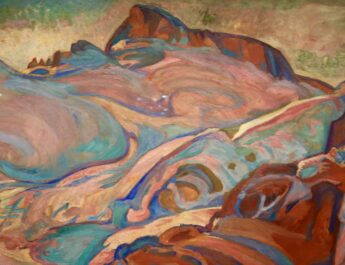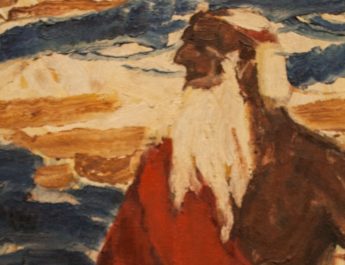Psalm 8
A Women’s Lectionary – First Sunday after Christmas Day A
Holy Name of Jesus ABC
New Year’s Day ABC
BibleHub
To the leader:A according to The Gittith.B A PsalmC of David.D
Notes on superscript
A “leader” = natsach. Properly, something that glitters from a distance. So, something that stands out, excels, has status/standing (such as a chief musician or superintendent of Temple services). This can also mean to be permanent or enduring.
B “Gittith” = gittith. 3x in OT – all psalms. From gitti (someone from Gath); from Gath (Philistine city called Gath, meaning “wine press”); from the same as gath (wine press); from nagan (to play a stringed instrument, song, melody, make music). This is Gittith – some kind of musical notation, perhaps referring to a harp from Gath.
C “psalm” = mizmor. From zamar (making music; used specially of music to worship God; music with singing, singing praise, singing psalms); may be from zamar (to trim or prune). This is a melody or a psalm.
D “David” = david. From the same as dod (beloved, love, uncle); the root may mean to boil, which is used figuratively to describe love. So, this implies someone you love such as a friend, a lover, or a close family member like an uncle. David’s name likely means something like “beloved one.”
1 O Lord,E our Sovereign,F
how majesticG is your nameH in all the earth!
You have set your gloryI above the heavens.J
Notes on verse 1
E “Lord” = YHVH. From havah (to be, become) or hayah (to come to pass, become, be). This is the name of the God of Israel, the self-existent and eternal one, the tetragrammaton. This pronunciation has been lost to time so “Lord” is generally used in its place.
F “Sovereign” = adon. From a root that means ruling or being sovereign. This is lord, master, or owner.
G “majestic” = addir. From adar (wide, glorious, honorable, great, magnificent). This is majestic, excellent, mighty, powerful, or noble.
H “name” = shem. May be from sum (to put, place, set). This is name, fame, renown. A name was thought to indicate something essential about a person – something about their individuality. So, this word can also mean honor, authority, or character.
I “glory” = hod. This is grandeur, beauty, glory, honor, or authority. It emphasizes a form or appearance with gravitas.
J “heavens” = shamayim. Root may mean being lofty. This is sky, the air, or heaven. It is in a dual noun form so this might refer to the part of the sky where the clouds move on the one hand and the part beyond that where the sun, moon, and stars are on the other hand.
2 Out of the mouths of babesK and infantsL
you have foundedM a bulwarkN because of your foes,O
to silenceP the enemy and the avenger.
Notes on verse 2
K “babes” = olel. Perhaps from uwl (to nurse, suckle; can also be used of a suckling lamb). This is a child or infant.
L “infants” = yanaq. This is to suckle or to nurse. In a causative sense, it can mean to give milk. So, this word can be used for a nursing mother or for her suckling child.
M “founded” = yasad. This is to establish, appoint, instruct. It is to set in a literal or figurative sense. Also means to sit down together and so to consult or take counsel.
N “bulwark” = oz. From azaz (to be strong, become fixed, be bold, prevail, be impudent; it means to be stout literally or figuratively. A Late Hebrew word). This is strength in the sense of force, majesty, praise, material and physical strength, the abstract notion of security. It can also speak of social or political power.
O “foes” = tsarar. This is to bind, restrict, narrow, be cramped, an adversary.
P “silence” = shabath. This is to rest, stop, repose, cease working. It implies to celebrate (as celebrating the Sabbath).
3 When I look at your heavens, the work of your fingers,Q
the moonR and the starsS that you have established;T
Notes on verse 3
Q “fingers” = etsba. Perhaps from the same as tseba (dye, something dipped). This is finger or toe – something used to seize.
R “moon” = yareach. Perhaps from the same as yerach (month). This is moon.
S “stars” = kokab. Perhaps from the same as kavah (to prick, blister, burn, scorch). This is a star as shining, stargaze. Figuratively, can mean prince.
T “established” = kun. Properly, this means in a perpendicular position. So, it is set up in a literal sense – establish, fix, fasten, prepare. In a figurative sense, it is certainty, to be firm, faithfulness, render sure or prosperous.
4 what are human beings that you are mindfulU of them,
mortalsV that you care forW them?
Notes on verse 4
U “are mindful” = zakar. From zakar (to remember, to mark something so that it can be recalled, to be mindful of, to mention). This is male. Properly, perhaps, it means one who is remembered, which is to say a male.
V “mortals” = ben + adam. Literally “son of man.” Adam is perhaps from adam (to be red, make ruddy); related to adamah (ground, dirt, earth). This is man, humankind, also Adam’s name. It refers to a human individual or humanity.
W “care for” = paqad. This is to attend to or visit – can be used for a friendly or violent encounter. So, it can be to oversee, care for, avenge, or charge.
5 Yet you have made them a little lowerX than God,Y
and crownedZ them with gloryAA and honor.BB
Notes on verse 5
X “made…lower” = chaser. 19x in OT. From chaser (to lack, need, become empty, to fail). This is needy, lacking, without, void, or destitute. This is “I shall not want” from Psalm 23:1.
Y “God” = Elohim.
Z “crowned” = atar. 7x in OT. To surround or encircle to defend, protect, or attack. It is crown in a literal or figurative sense.
AA “glory” = kabod. From kabad (to be heavy, weighty, burdensome). This is weighty. Figuratively, glorious, abundant, riches, honor, splendor – a reference to one’s reputation or character. This word is often used to describe God and God’s presence.
BB “honor” = hadar. From hadar (to honor or adorn; majestic, respected, glorious; to favor or honor; to be proud). This is ornament, splendor, beauty, dignity, majesty, magnificence, and glory.
6 You have given them dominionCC over the works of your hands;
you have put all things under their feet,
7 all sheepDD and oxen,
and also the beastsEE of the field,
Notes on verses 6-7
CC “given…dominion” = mashal. This is to rule, reign, govern, have authority, wield
DD “sheep” = tsoneh. 2x in OT. Perhaps from tson (flock of sheep and goats). This is flocks or sheep.
EE “beasts” = behemah. This is animal or cattle. It is often used of large quadrupeds.
8 the birdsFF of the air,GG and the fish of the sea,HH
whatever passes alongII the pathsJJ of the seas.
9 O Lord, our Sovereign,
how majestic is your name in all the earth!
Notes on verses 8-9
FF “birds” = tsippor. From tsaphar (to skip about, maybe to depart). This is a little bird like a sparrow – a little bird as one that hops about.
GG “air” = shamayim. Same as “heavens” in v1. See note J above.
HH “sea” = yam. Root may mean to roar. This is the sea, often referring to the Mediterranean. It comes from the root in the sense of the roar of crashing surf. This word is sometimes used for rivers or other sources of water. It can mean to the west or to the south.
II “passes along” = abar. This is to pass over or cross over. It is used for transitions, whether literal or figurative. It can also mean to escape, alienate, or fail. This is the root verb from which “Hebrew” is drawn.
JJ “paths” = orach. From arach (to go, travel, wander). This is a road that is widely used, highway, caravan, traveler, troop.
Image credit: “Australia from Space” by Kevin Gill




